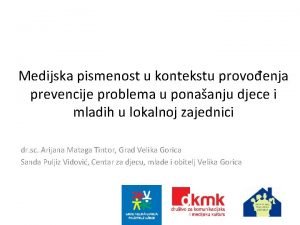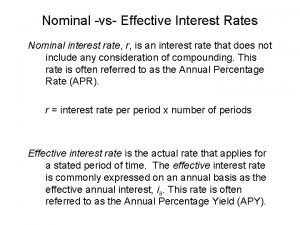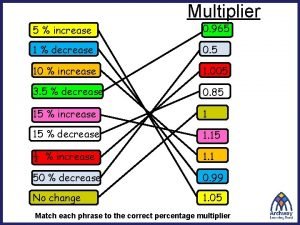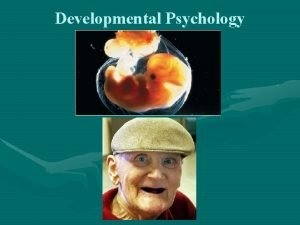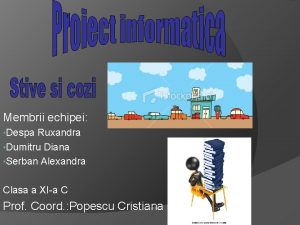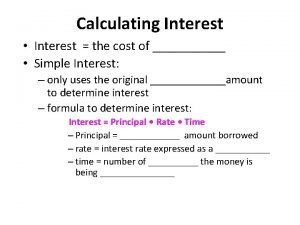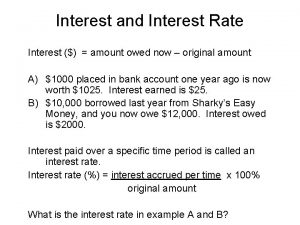Research Interest Sanda Despa Ph D Department of










![Similar [Na]i and diastolic [Ca]i in myocytes from Ank. B+/- and WT mice [Na]i Similar [Na]i and diastolic [Ca]i in myocytes from Ank. B+/- and WT mice [Na]i](https://slidetodoc.com/presentation_image/61643da65b6c308712f8bb0c40aa54bf/image-11.jpg)








- Slides: 19

Research Interest Sanda Despa, Ph. D Department of Pharmacology Excitation-contraction coupling, Ca 2+ and Na+ regulation in the normal and diseased heart; Cellular bases of triggered ventricular arrhythmias

Cardiac excitation-contraction coupling Ca SR NCX T-Tubule 3 Na Ca Ca PLB Ry. R Ca ICa ATP NCX Na 2 K PLM Sarcolemma 3 Na ATP

Cardiac excitation-contraction coupling Ca SR NCX T-Tubule 3 Na Ca Ca PLB Ry. R Ca ICa ATP NCX Na 2 K PLM Sarcolemma 3 Na ATP

Contraction of the heart 3 Na Na Ca Ca SR NCX T-Tubule 3 Na Ca ATP PLB Ry. R Ca ICa Ca NCX PLM Sarcolemma. ATP 2 K ATP 3 Na

Relaxation of the heart 3 Na T-Tubule 3 Na Ca Ca PLB SR NCX Ca Ry. R Ca ICa ATP Ca 2 K PLM Sarcolemma Na 3 Na ATP

Ca 2+ and contraction-relaxation of a cardiac myocyte Rat ventricular myocyte loaded with a Ca 2+-sensitive fluorescent indicator

Project 1: Ca dysregulation and arrhythmias induced by loss-of-function of ankyrin B Ankyrin-B = multivalent “adaptor” protein that targets select membrane proteins to the cytoskeleton

Ankyrin-B loss of function mutations lead to long QT 4 syndrome and ventricular arrhythmias in humans E 1425 G mutation Long QT 4 syndrome DII Q-T Ventricular arrhythmias DIII 1 sec QTc= 450 ms in symptomatic patients (normal QTc<420 ms in men; <440 ms in women) Long QT syndromes in humans * * * 1 sec (Schott JJ et al. , Am. J. Hum. Genet. 1994)

Decreased NCX and NKA expression, particularly at the T-tubules, in Ank. B+/- myocytes Ank. B+/- mice = mice heterozygous for a null mutation in ankyrin-B gene. (Mohler et al. , Nature 2003)

Reduced NCX and NKA function in Ank. B+/- myocytes NCX function Caffeine NKA function Camors, …, Despa. JMCC, 2012
![Similar Nai and diastolic Cai in myocytes from Ank B and WT mice Nai Similar [Na]i and diastolic [Ca]i in myocytes from Ank. B+/- and WT mice [Na]i](https://slidetodoc.com/presentation_image/61643da65b6c308712f8bb0c40aa54bf/image-11.jpg)
Similar [Na]i and diastolic [Ca]i in myocytes from Ank. B+/- and WT mice [Na]i Resting Diastolic [Ca]i Pacing Camors, …, Despa. JMCC, 2012

Larger Ca transients, SR Ca load & fractional release in Ank. B+/- mice Camors, …, Despa. JMCC, 2012

Enhanced Ca spark frequency in intact Ank. B+/- mice 250 0 250 WT 1 s Caffeine 0 1 m. M Ca Tyrode 0 Na/ 0 Ca Tyrode Caffeine 200 ms 10 µm 40 µm Ank. B+/- Camors, …, Despa. JMCC, 2012

More pro-arrhythmic Ca waves in Ank. B+/- myocytes Ank. B+/- Control condition ISO (1 µM) 60 % 20 % 10 % Camors, …, Despa. JMCC, 2012

Work in progress; Questions: 1. What causes the increased propensity for Ca sparks and waves in Ank. B+/- myocytes? Altered cytosolic Ry. R regulation? WT Ank. B+/- diastolic Ca ATP Ca Ca P Ca T-tubule Ca Ca [Ca] Cleft Ca Ca NCX Cleft T-tubule Ca K Ry. R ATP Na B 56 NKA- 2 Nucle en ar ve l o pe IP 3 R NKA-α 1 Ry. R Nucle IP 3 R ar env e lop e Ank. B Ca

Work in progress; Questions: 2. Does Ank. B proteolysis by calpain lead to a cardiac phenotype similar to that caused by genetic Ank. B loss-of-function? Ank. B protein but not m. RNA is reduced in the infarct border zone after MI Protein expression m. RNA level Hundt et al. , Cardiovasc Res. 2009; 81: 742

Work in progress; Questions: 2. Does Ank. B proteolysis by calpain lead to a cardiac phenotype similar to that caused by genetic Ank. B loss-of-function? Ank. B & NKA protein expression are reduced following ischemia/reperfusion; the effect is prevented by calpain inhibition NKA Inserte et al. , Circ Res 2005; 97: 465. How does calpain activation affect the protein expression, subcellular distribution and function of Ank. B, NCX and NKA? What is the role of Ank. B proteolysis by calpain in the structural and electrical remodeling of the heart following ischemia/reperfusion?

Project 2: Electrical remodeling and arrhythmias in diabetic heart disease How is Ca cycling altered in diabetic heart disease? Timeline! Pre-diabetic stage Diabetic stage Is [Na]i altered in diabetic heart disease? Does this further alter the cardiac metabolism? Long QT ROS production → slowly inactivating INa → [Na]i → [Ca]m → ATP Electrical remodeling & occurrence of arrhythmias in diabetic hearts

Acknowledgments University of California Davis Emmanuel Camors Kevin Voelker Florin Despa Samuel Galice Jeffrey Elliot Kaleena Jackson Brian Koch Donald M. Bers Kenneth Ginsburg Khana Dao Ohio State University Peter Mohler University of California Los Angeles Enrico Stefani Yong Wu University of Cincinnati Jerry B. Lingrel University of Manchester Fabian Brette Funding from NIH & AHA
 Sanda puljiz vidović
Sanda puljiz vidović Sanda oswald
Sanda oswald Usporedno raščlambeni esej
Usporedno raščlambeni esej Sanda puljiz vidović
Sanda puljiz vidović What is real interest rate and nominal interest rate
What is real interest rate and nominal interest rate Effective rate
Effective rate Simple interest
Simple interest Phenomenon of interest in research
Phenomenon of interest in research What are the roles of marketing research
What are the roles of marketing research Research report vs research proposal
Research report vs research proposal Research design vs research method
Research design vs research method Sample of appendices in research paper
Sample of appendices in research paper Descriptive exploratory research design
Descriptive exploratory research design Definition of scope in research
Definition of scope in research Qualitative research design
Qualitative research design Contrast applied research and basic research
Contrast applied research and basic research Identification and formulation of research problem
Identification and formulation of research problem Research paradigm example
Research paradigm example Operational thought
Operational thought Define causal comparative research
Define causal comparative research



